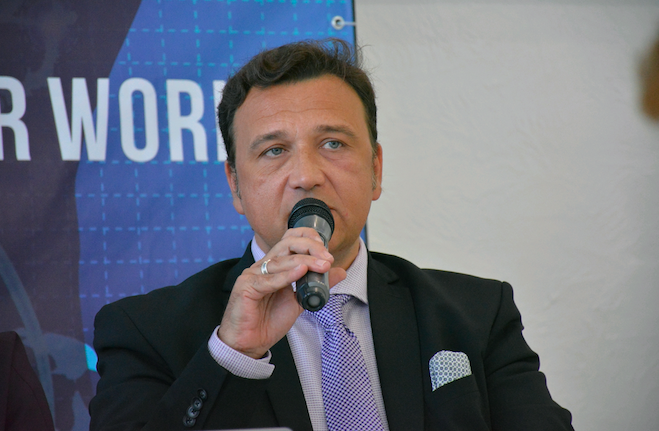By Arnaud Develay
On the morning of October 10th, 2022, the Russian Federation launched a comprehensive ballistic attack on most of Ukraine’s command and control structure centers.
While Zelensky’s « Presidential office » and the headquarters of the SBU are known to have suffered hits, it is the disabling of bridges as well as electric and thermal plants which in effect have incapacitated the country in ways not seen since the beginning of Russia’s Special Military Operation.
This sudden and massive strike was undertaken as a result of the report handed over the night before to President Vladimir PUTIN by the Head of the Investigation Committee, Aleksander BASTRYKIN in the wake of the blast having occurred just hours earlier on the KERTCH bridge, (one of PUTIN’s most celebrated achievements) and which killed as of this writing 5 civilians while causing an interruption of traffic but for a few hours. (The repairs are expected to last a month)
Bastrykin’s report laid out the following element to what is still an ongoing investigation:
– The criminal investigation falls under”terrorism”.
– Suspects have been identified as being among the transporters by the FSB.
– The truck’s itinerary has been reconstituted. It left Bulgaria before transiting though Georgia, Armenia, North Ossetia until it entered the territories of Krasnodar in Russia proper.
– The SBU (Ukrainian secret service) coordinated its efforts with foreign nationals and citizens of the Russian Federation.
The Special Military Operation has morphed into an anti-terrorism campaign
On October 10th, the Security Council of the Russian Federation met to discuss the latest developments. It came to the conclusion that in the wake of the assassination of a prominent Russian national (Daria Dugina) on Russian soil by a SBU operative, the destruction of the pipelines of NorthStream 2 and the attack on the Kertch bridge, the objectives of the NATO-supported Kiev regime has opted to conduct operation without paying heed to the physical integrity of civilians, be they their own nationals or those of the Russian federation and other States.
French military reporter Adrian Bocqué who had covered the alleged “bucha massacre” narrowly escaped an assassination attempt while in Istanbul but still suffered severe injury. (An SBU officer was later captured and revealed to have organized the hit in cooperation with Turkish nationals). In all, the FSB revealed that it has averted no less than hundreds of terrorist attacks in the last few days. As conventional wisdom would have it, the public only hears about it when one of the suspects manages to get through the dragnet and carry out the operation.
To make matters worse, the Ukrainian forces have been shelling the nuclear plant in Zaparojieh region even though experts have warned that it could result in the worse nuclear incident since Chernobyl. The plant is known as the largest in Europe and any radiation leakage could affect areas as far West as Austria for decades to come, contaminating soils and water. These facts are known to the public at large and despite the inspection carried out by the IAEA last August, the United Nations Security Council has repeatedly ignored the dangers while insinuating that Russia is shelling its own troops! Indeed, the Head of the International Atomic Energy Agency (IAEA) Fabio Grossi has gone out of his way in his report to clear Ukraine from any wrongdoing but called for a demilitarization of the area (presumably to allow the Ukrainian Director of the plant to carry out some act of sabotage since it was revealed earlier in October that he was in the employ of the SBU).
Last but least, Zelensky himself went on the air on October 8th calling for preemptive nuclear strikes on Russia. Although he attempted to walk back these statements within 24 hours after uttering them, the world could really see someone who obviously does not take the time to contemplate the legal consequences of his words and/or actions before acting them out.
In an address to the Federation’s governors, Putin noted that “through the nature of his actions, (Kiev) has devolved to the level of an international terrorist organization”.
Vice-Chair of Russia’s Council for National Security, Dmitry Medvedev went one step further, declaring: “The first episode has been played. There will be others. Something else. I am going to express my personal position. I can’t help but mention it now.e Ukrainian state in its current configuration with a Nazi political regime will pose a constant, direct and clear threat to Russia. Therefore, in addition to protecting our people and protecting the country’s borders, the goal of our future actions, in my opinion, should be the complete dismantling of the Ukrainian political regime.”
The gloves are off.

